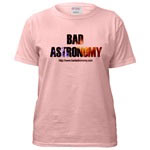
| Bad Astronomy |
|
|
|
BA Blog
|
|
Q & BA
|
|
Bulletin Board
|
| Media |
|
|
|
Bitesize Astronomy
|
|
Bad Astro Store
|
|
Mad Science
|
|
Fun Stuff
|
| Site Info |
|
|
|
Links
|
| RELATED SITES |
| - Universe Today |
| - APOD |
| - The Nine Planets |
| - Mystery Investigators |
| - Slacker Astronomy |
| - Skepticality |
Buy My Stuff

Keep Bad Astronomy close to your heart, and help make me
filthy rich. Hey, it's either this or one of those really
irritating PayPal donation buttons here.
Subject: What would life be like on a planet near/in the center of our galaxy?
Date: Mon Mar 20 23:40:10 2000Posted by Miguel
Grade level: nonaligned School: No school entered.
City: Boston State/Province: MA Country: USA
Area of science: Astronomy
ID: 953617210.As
Message:
I couldn't find a satisfying answer to my question in your archives, what I mainly want to know is: If our solar system was in the cluster of stars at the center of our galaxy, would there be permanent daylight? Would there be any difference to our environment? Miguel
What would life be like near a galactic center? In a word, dangerous. The centers of galaxies can be bad places to live. For one thing, stars are much closer together there. Out here, halfway out from the center, stars are relatively far apart, averaging very roughly 2-5 light years apart. Near the center of the Galaxy stars might be less than one light year apart on average.
A direct collision with a star would be exceedingly rare, but you don't need to impact a passing star for them to be bad news. The solar system has a vast supply of comets orbiting the Sun in a region called the Oort Cloud, which starts a few tens or hundreds of billions of kilometers away from the Sun and extends out to perhaps a light year. The gravity of a passing star could easily knock a great many comets off their orbits, sending them to the inner solar system. It would be likely, near the galactic center, for such passages to send hundreds or more comets screaming in quite often. Impacts from those comets could cause mass extinctions, and lots of such impacts would be bad, to say the least.
Another problem is that most galaxies, it is theorized, have enormous black holes in their cores. Most of them are quiescent; they don't appear to be ``eating'' much of their surrounding material. Some, though, are gobbling up matter at prodigious rates. This matter spirals in, heats up, and pours out tremendous quantities of x rays. Anyone living near such a black hole would be bathed in radiation. It's unlikely life could form at all in such an environment.
However, there are trade-offs. The proximity of stars to such a planet would make the sky glitter with tens or hundreds of times as many stars as we see in the sky. Many of them might be giants or supergiants, making them far brighter than any star in our sky now (excepting, of course, the Sun). There may never be a true night on such a planet, with stars a thousand times brighter than Venus shining down on it. What a view. Unfortunately, it would come with the cost outlined above.
|
|
MADSCI Q&A
Q&A 1996
Q&A 1997
Q&A 1998
Q&A 1999
Q&A 2000
| Subscribe to the Bad Astronomy Newsletter! |
| Talk about Bad Astronomy on the BA Bulletin Board! |